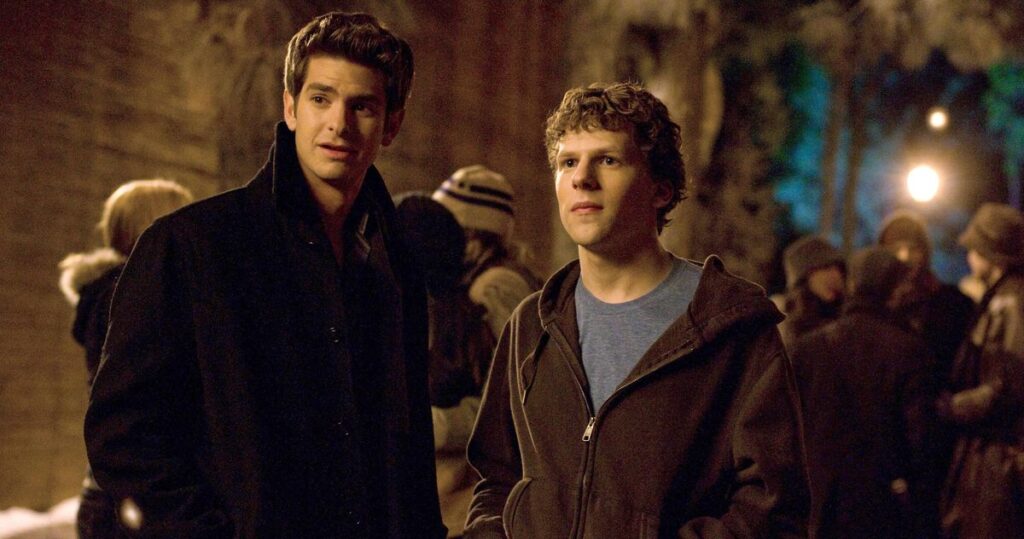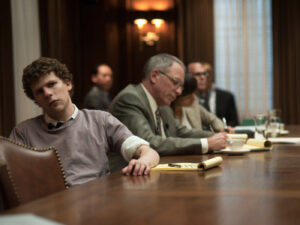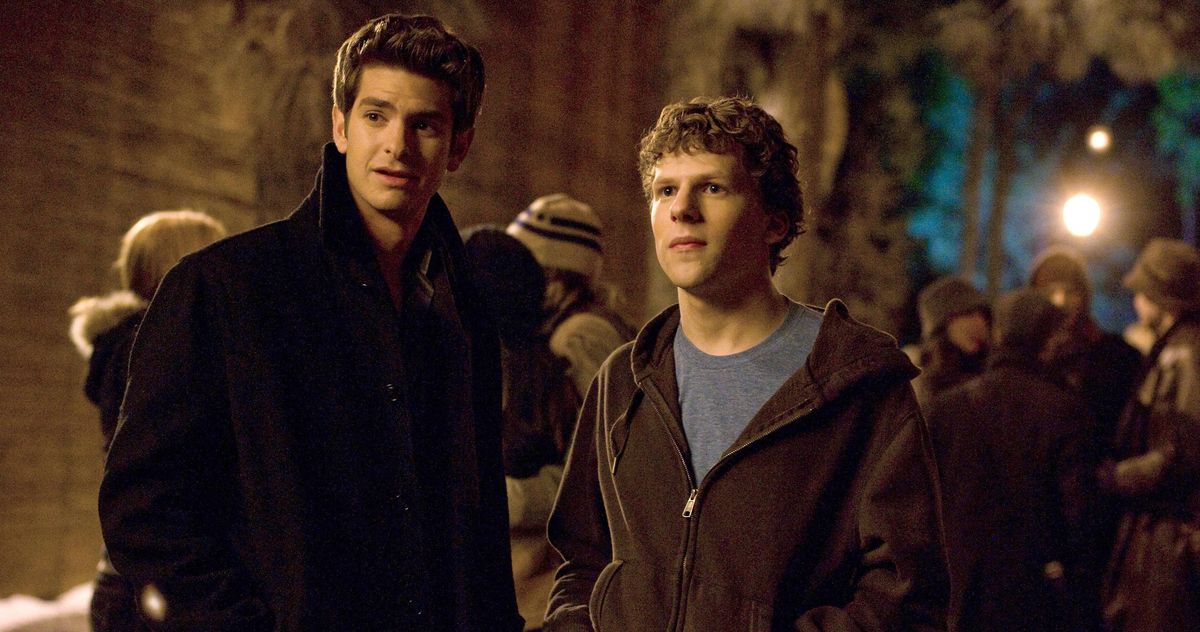
‘What’s on your mind?’—Ten Years of The Social Network
Ten years on, The Social Network is still the sensation it was in 2010. Few films have captured the sheer speed at which tech startups grow, thrive—and in some cases—crash and burn into oblivion.
If your inner Harvey Specter is looking for a fast-paced legal drama, or if you just like movies that dabble in different genres, this review might just convince you to rethink The Social Network. If you want to take a look into the cutthroat competition in tech startups, and possibly even get inspired by it, don’t think twice before giving this a shot!
During one of the many conversations between the two friends (and the two leads)—Eduardo Saverin and Mark Zuckerberg—a subtle reference to Lewis Carrol’s poem ‘Jabberwocky’ is made. Jabberwocky, in Carrol’s own words, means ‘the fruit of much-excited discussion’. A whimsical work of fiction, with some words that make no sense, the poem reflects the movie exceptionally well—a work of fiction that’s not meant to be taken too seriously. Perhaps this is Fincher’s way of telling the audience to not fixate upon the facts in the film. Treat this like the masterful piece of fiction it’s meant to be. Admittedly, to use this simple reference that barely stays on screen for two seconds might be a stretch—the movie disclaims accuracy by doing so.
The Social Network‘s relevance matters, its underlying message of ‘connections’ and the dangers of the tech industry matters. But before exploring the more significant aspects of this movie that tie into real-world issues, let’s take a look at the movie’s splendid performances.
Performances, Writing, and Screenplay
Directed by David Fincher and written by Aaron Sorkin, this film draws you in immediately. The first scene is set in a noisy bar, where most filmmakers would play up the noise and play down the conflict. Fincher, however, plays up the conflict, in turn establishing the tone of the movie.
The scene introduces us to Mark Zuckerberg and his naïve ways. He has pride and is not ready to make sense of what his girlfriend says. He’s extreme, headstrong, and proud of his talents and his conscience. Even though this film has the tone of a biopic, Fincher makes it clear that Zuckerberg is no underdog deserving of the audience’s pity. He’s human, and his flaws and talents take centre stage in this film.
Jesse Eisenberg is magnificent here (We wonder if he was cast because Eisenberg and Zuckerberg rhyme rather uncannily?) Definitely not. He plays a believable, provocative, gullible programmer too well, well enough to trick you into asking, “Is this how Zuckerberg is in real life?” The fine line between the love-hate relationship that the audience develops for him is skillfully captured and remarkably executed by Eisenberg.
Eduardo Saverin, the co-founder of Facebook, played by Andrew Garfield, has a starkly different personality than Zuckerberg; and Fincher makes sure to point it out. Garfield does a fantastic job portraying him, bringing across his anguish and his sensibilities. He cannot sling webs or jump between buildings in this one, but he sure knows how to write algorithms on dorm-room windows within seconds. Saverin’s was probably the most challenging character to pull off; his portrayal required the actor to navigate through a wide range of emotions, and here, Garfield does his job exceedingly well!
Justin Timberlake, the Friends with Benefits actor, plays the manipulating antagonist, a broke but convincing businessman with a questionable reputation. Through his character, bigger issues of paedophilia and drug possession are hinted at but very limitedly explored. The overachieving Winklevoss twins bring an interesting character arc to the plot. Fincher poorly tries to convince us that different hairstyles somehow bring about different personalities, but it is undeniable that he makes sure their sensibilities are identical. Armie Hammer does his best to portray these twins differently, but he finds himself trapped within Fincher’s restrictions.
Bottles and bottles of beers are gulped down, connections are grown, and enemies are made. But what makes the movie ignite on screen? Is it the scenes that are so tightly constructed? Is it in the raw, visceral light on reality, the actuality of the motivation needed behind a startup? It is perhaps the intense music and energy that crackles and buzzes throughout the movie, without catching a break, reflecting the reality of the early stages of a business setup. Jeff Cronenweth partners up with David Fincher once again—he was the cinematographer for Gone Girl and Fight Club—and does brilliantly. You can feel the motivation of the characters pulsate through the screens. The breakneck pace will leave you feeling overwhelmed, but that is precisely what Fincher wants.

The deposition scenes—albeit a bit repetitive—work into the bigger picture of the film. They act as a premonition, a cautionary tale for every aspiring CEO out there.
Some pranks and parties in the movie reek of misogyny, it doesn’t do much to condemn the same. It also showcases what ‘shares’ and ‘likes’ can do to the self-image of vulnerable teens. Technology is not without its limits. The film’s relevance is perhaps the most steadfast today—in an age where ‘revenge porn’ and other acts of harassment are, unfortunately, commonplace.
The Themes of the Film and The Social Dilemma
‘Connection’ is an essential theme of the film. Zuckerberg is bad at human connections—the abstract and the unspoken. You can empathise with him to a certain level, what this fictional version of him tries to do and clearly fails. On the other hand, the very essence of human connection—conversations, spark his ideas to create ‘The Facebook’ itself. The movie claims that the creation of ‘Facemash’—a website created by Zuckerberg to rate his female classmates’ appearances—was seminal to Facebook’s making; but in doing so, it brushes off the implications of such a website.

Facemash was a sexist and irresponsible act on Zuckerberg’s end. In the movie, he seemingly makes a “drunken mistake”—an accidental creation with little repercussions. However, in the confusing interplay of facts and myths that this movie dabbles with, Zuckerberg was already dating Priscilla Chan then. So, is a bad breakup enough justification for comparing women? When asked about it in his testimony before Congress in 2018, he brushed it off by stating that his juvenility must be considered as he was in his sophomore year at college.
This review feels incomplete without some present-day updates regarding the app, and rightly so when considering its net worth of $600 Billion (as of May 08, 2020). It’s managed to maintain its relevance over 14 years. But, in 2018, a significant privacy breach tarnished the app’s name, and The Social Network has not been viewed in the same light ever since. When you think of Facebook—especially with the lockdown-influenced popularity of apps like TikTok—it’s easy to assume that its significance might be fading.
Facebook is still one of the most used social platforms, with around 2.45 Billion active users. It will never really be entirely out of the market, at least not anytime soon. By buying Instagram and WhatsApp, not only has it proved that it’s here to stay, but it’s also telling us about its capabilities, louder than ever. Moreover, these happenings also tell us what we need for a business to flourish—a stronghold on the market and the ability to make risky decisions. To be able to stay consistently relevant is another feat of Facebook and the pedestal it has managed to keep itself on top of.
US Senator Mark Warner spoke about the need for Congress interference to protect the privacy of social media users after Facebook revealed that an attack on the computer network had exposed more than 50 million accounts. In this day and age of social media, and the question of privacy and securing your information, these kinds of happenings with the world’s biggest social media platform reinforces how vulnerable we are while entering our personal details on these websites.
In Conclusion
All in all, the script never slacks, and the performances remain fresh. Interestingly, the writing also provides each character with some substance despite their short screen-time, making the screenplay a more holistic piece of writing.
PS: Andrew Garfield saying, ‘Sorry, my Prada’s at the cleaners along with my hoodie and my f*ck you flip flops, you pretentious d*@chebag!’ was probably the best line in the film, and if you’ve seen the movie, you’ll know why.
Written by Avaneesh M and Aishwarya Sabarinath for MTTN
Edited by Avaneesh Jai Damaraju for MTTN
Featured Image Courtesy: The Kim Newman Website, Vulture, The Verge, and Sony Pictures

Leave a Reply
You must be logged in to post a comment.